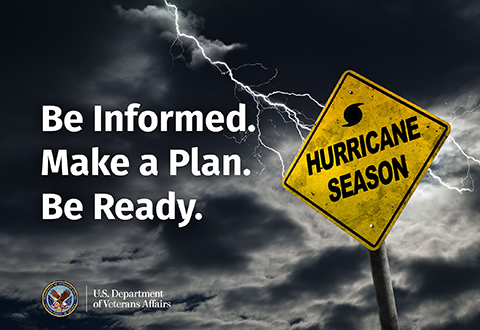Be Informed. Make a Plan. Be Ready.

Now is the time to be prepared for a tropical weather event.
In a matter of minutes, the powerful winds produced by a hurricane or tropical storm can rip roofs off buildings, topple trees, cause massive flooding, and even cause death. Although this can sometimes be a reality, you can take preparedness steps now to ensure your safety, health, and well-being
What is a hurricane or tropical storm?
Hurricanes and tropical storms are massive systems that form over warm ocean waters and move toward land. Potential threats from these storms include powerful winds, heavy rainfall, storm surges, coastal and inland flooding, rip currents, tornadoes, and landslides. The Atlantic hurricane season runs from June 1 to November 30. The most active time of the season is September. The 2018 hurricane season was one of the most active and destructive in recent years. In total, the season produced 15 named storms, including eight hurricanes of which two were “major” (Category 3, 4 or 5). An average season has 12 named storms, six hurricanes, and three major hurricanes.
Don’t Delay. Prepare Now.
Preparation for hurricane season is critically important. Do not wait until a storm watch or warning is issued for your area to begin your preparations. The best time to prepare is now. You can ensure you are appropriately prepared by:
- Knowing your area’s risk of hurricanes.
- Signing up for your community’s warning system. The Emergency Alert System (EAS) and National Oceanic and Atmospheric Administration (NOAA) Weather Radio also provide emergency alerts.
- Practicing movement to a safe shelter for high winds, such as a FEMA safe room or ICC 500 storm shelter. The next best protection is a small, interior, windowless room in a sturdy building on the lowest level that is not subject to flooding.
- Making plans to evacuate or sheltering in place.
- Becoming familiar with your evacuation zone, the evacuation route, and shelter locations.
- Gathering needed supplies for at least three days, although 5-7 days may be better. Keep in mind each person’s specific needs, including medication. Don’t forget the needs of pets.
- Keeping important documents in a safe place or create password-protected digital copies.
- Protecting your property. Declutter drains and gutters. Install check valves in plumbing to prevent backups. Consider hurricane shutters. Review insurance policies.
For more helpful information and tips on how you can be prepared for hurricane season, please visit the VA Sunshine Healthcare Network’s Hurricane Tips for Veterans and Families webpage at: https://www.visn8.va.gov/hurricane_tips.asp.
















